|
TPA audio player
|
We are the Stronghold System and we live with dissociative identity disorder. We also self identify as Plural because we are People, not parts. Together with an amazing team, we run The Plural Association nonprofit, including The Plural Warmline, this website, a youtube channel about Plurality and our online community for Plurals.
Here we invite all sorts of Plurals to find community & support. We often talk with people there, who explain they do not understand the differences between Plurality and DID. Or how it is similar. Some people do not understand why we try to bring people together in one community & under one umbrella. We hope the following FAQ can clear up some of the confusion and questions (mostly DID) people have expressed.
Table of Contents
Plural FAQ:
What does Plural mean?
” everyone who self-identifies as being or having more than one individual within a single body”
Plural simply means People who are Many. It is an umbrella term that people may use freely, to self identify with. It includes all sorts of people & experiences. Including but in no way limited to how psychology explains multiplicity. Nor does it indicate how someone became Many or if they are disordered or disabled in any way. Plural is an identity, a community, an umbrella, a label. Not a level or destination to reach.
The Plural Association (TPA) nonprofit defines plurals in it’s legal documents as ‘everyone who self-identifies as being or having more than one individual within a single body.’ However it is important to note that both this website as well as TPA of course also welcome people who do not self identify with the Plural label and we will always be respectful and mindful of the language you and your system use.
What kind of Plurals are out there?
Every System is different and there are many labels. If you are curious about different types of Plurals and the many, over 250 beautiful labels created, you can look here for definitions of Endogenic systems, Parogenic systems, Quoigenic systems and many more: https://pluralpedia.org/
To learn more about the origin of the Endogenic and Traumagenic labels and the System who coined the terms click here.
How can I know if I’m Plural?
If you want to self discover if you might be Plural, we wrote this article.
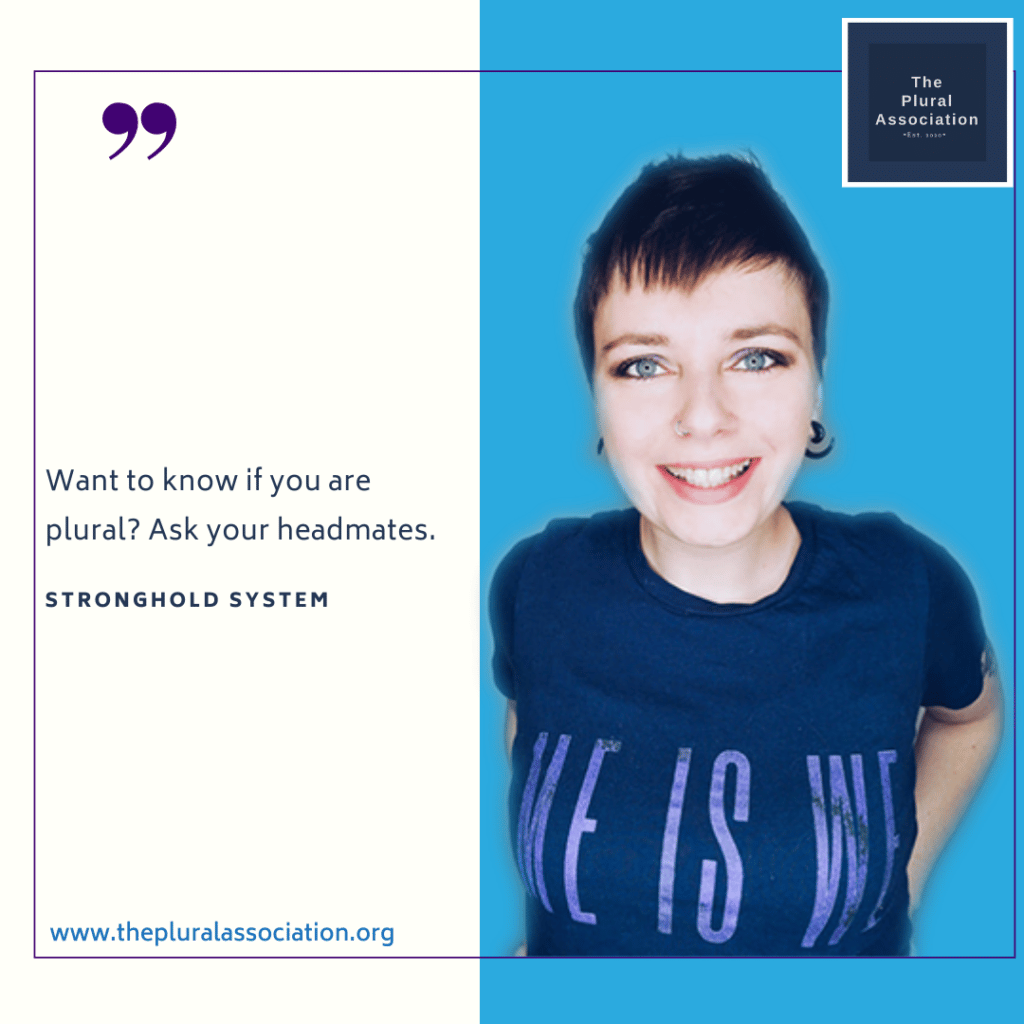
Why an umbrella community?
We truly believe people with DID & people who are Plural in different ways, can learn so much from each other. We choose to look at our similarities rather than our differences. And we provide an inclusive of all safe space where we can grow and learn together as ‘together we are stronger.’
Don’t DID people deserve their own spaces?
Yes, they for sure do. I believe a great place for that is in a therapy setting. Or groups therapy setting. I think outside of that we can provide our own groups for peer to peer support, online or in real life. There are many groups on facebook for support for solely DID. (Albeit not for diagnosed DID, that belongs more in a therapy setting.)
AlterNation is a Facebook group where we can come together and it is actively promoted to learn from each other. As long as we can do that in (the utmost) respectful way, I think it is an amazing opportunity.
In our own online Community we have a lot more freedom and hence we have created label specific support groups. There is a support group for DID, another one for OSDD and yet another one for Plurality.
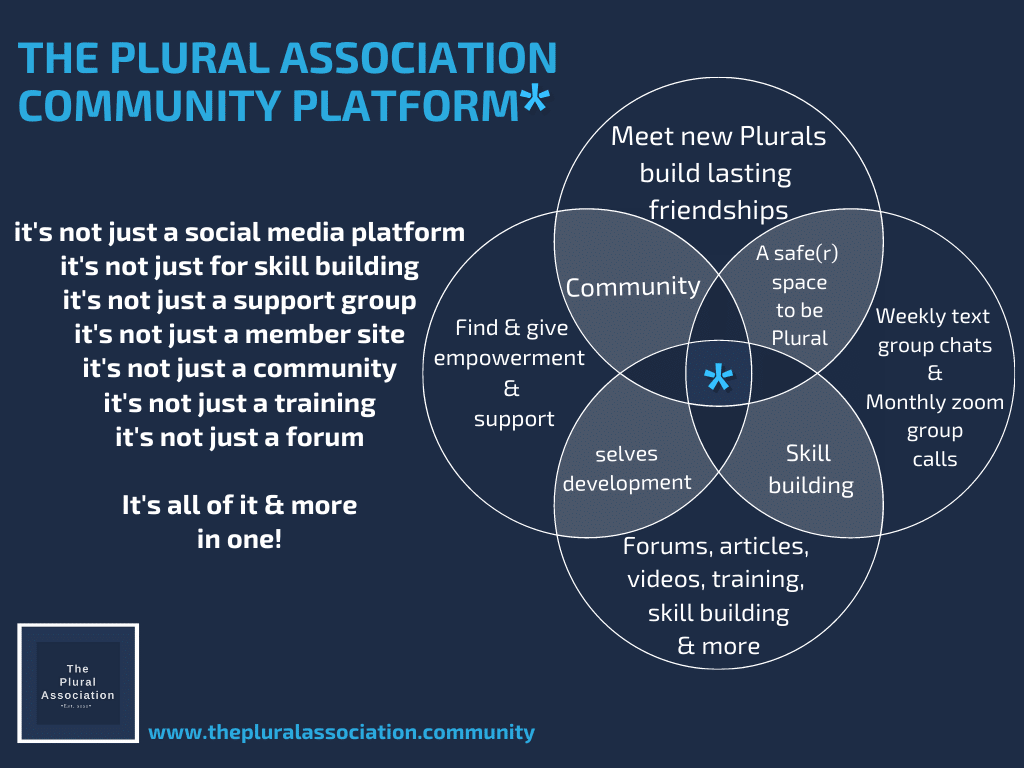
Is Plurality something new?
We know Plurality, as in being Many, has been around for ages. Long before psychology was a thing. Most often described as spiritual experiences by mystics not from the west. Denying Plurality exists outside of psychology is erasure and white washing. The umbrella term Plural has been around for as long as the general internet has and probably before that.
Is their a common cause for being Many?
Back in the day we thought there was a common cause for being gay, trans or for example autistic. Turns out, that was not true at all. And that misinformation and stigma is something still being battled today. We choose not to make the same mistake when it comes to Plurality and to be open minded & inclusive of all instead.
What about personhood and plurality?
If we strictly follow the medical model for DID/OSDD then we are parts of the personality and not multiple people in one body. You might experience this very differently, just like we do. We wrote in detail about personhood within plurality and DID/OSDD here.
What says the science?
One highly debated topic is whether psychology is really science. As psychology is theories. We know we cannot prove spiritual experiences either. Consciousness can’t be measured and so much cannot yet be explained or proven. Psychology cannot repeat an experiment and always get the same results. They cannot because all people are different. Even the medication they invent does not provide the same results for everyone. There are some interesting Anthropology papers available into nonpathological experiences of dissociation, including the Protean Self.
And the MRI study that shows switching?
Alters/switches between Headmates are visible on MRI scans in DID people and not in pretending actors. But that in no way equals non-DID Plural systems. As the same experiments are not done with Endogenic, spiritual or other Plural systems.
Does the DSM mention Plurality?
Yes, but not with that word. The dsm-5 mentions cultural and religious cases of multiplicity often. It excludes it from a DID diagnosis. But it does in no way invalidate these people their existence or experience. So why should we?!
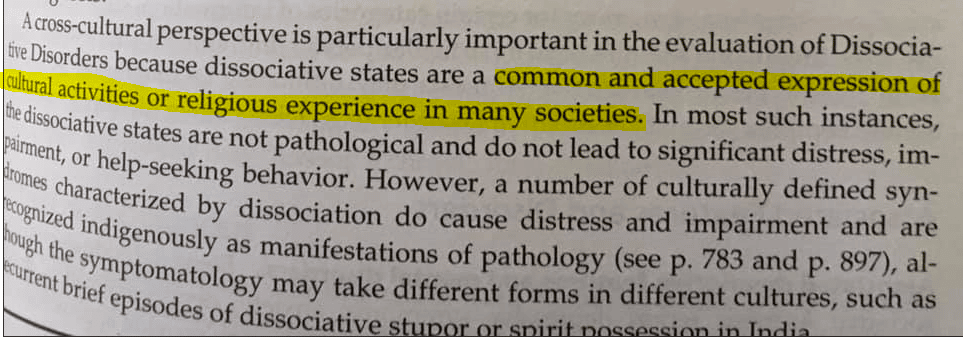
Does the DSM state that DID is caused by trauma?
The DSM-5 describes that overwhelming experiences, traumatic events and/or abuse in childhood are associated with DID. It does not state it is caused by trauma. Nor is trauma part of the criteria for the DID diagnosis. Yes, research does show most (if not all) DID is associated with trauma as well. But people with forms of non disordered Plurality do not have DID and are not in therapy (for DID) and hence they are not researched/studied. Nor do (most of them) want to be studied.
What about the DSM criteria?
Criteria A states we can self report signs and symptoms (parts.) Like explained above, trauma is not a diagnostic criteria. Which I conclude to, hence anyone can self report parts, DID or not. There is also no point in denying someone’s (internal) experience. It also explains in criteria D that spiritual or cultural experiences of multiplicity exclude a DID diagnosis. It however does not say, these people are then not Many or in their words, do not have self reported parts.
One could even argue (for fun) that criteria E implies one could experience parts only when intoxicated. But it of course also excludes a DID diagnosis. But again, that does not equal that they do not have parts when they self report them. Nor does it equal someone being disordered or disabled. Empower people, believe them and do not put labels on them that they do not self identify with as you are not their therapist. (If you are their therapist, kudos to you for reading this!)
Should we tell new people about trauma?
Suggesting or worse demanding, that trauma has to be part of the Plural experience is unethical and really not appreciated in our communities as it is suggestive and gatekeeping. It’s something therapists are told and trained not to do. So who are we, to do so instead. In the case of DID, all these years protectors worked hard to keep it a secret. It is never up to us to disclose that information. It could lead to flooding and we can’t help people in crisis. It’s what the lawsuits in the 90’s were about. Let’s not repeat those mistakes. It could also very well be that someone joins a DID group but is Plural. So it is safest and most ethical to not make the assumption.
So some systems are trauma free?
Not many people in this world are trauma free. Let alone ‘overwhelming experience’ free. Just because some Plurals say trauma did not cause their Plurality, does not equal these or all (sub groups of) Plurals have never experienced (childhood) trauma. To incline otherwise is just as wrong as demanding or suggesting trauma.
So all Plurals deserve support?
Yes, all Plurals who want support, deserve support and should be able to access that support. Our surveys show again and again that the label a System identifies with, doesn’t indicate if they desire or need support or not. There are also many mixed origin Systems, people who are still discovering, people who just don’t care etc.
Do Plurals create alters on purpose?
Although there are people who created or invited their Headmates and/or Plurality on purpose, most Plurals find out they are Many, in the same way, we found out we have DID. They can’t stop their Plurality or switching, yet do not experience it as (an) intrusion either, like some of us with DID. As their Plural experience is non disordered, they most often do not experience amnesia and/or do not experience distress or impairment in important areas of functioning. But just as people with DID, most of them can’t make their alters go away.
Is it factitious disorder or delusions?
We wrote extensively about how non-disordered Plurality is not factitious disorder here.
Is there a Plural Pride Day?
Yes! It’s annually in the third week of July & celebrated during the Plural Acceptance Week. Everyone who is Many & our supporters are welcome to join! More information can be found at Plural Events.
How can allies help individual Plurals?
Allies can best help Plural people by listening and asking appropriate questions to individuals in systems if and when they present themselves. Everyone is different and with that comes different desires and needs, that should be taken into account. Make sure you treat individual system members (age) appropriate. Be respectful and if they share this information, make sure to use the correct name(s) and pronouns. Realize that switching costs energy, accept no for an answer and don’t push for details.
Be kind, understanding, patient and helpful when you know someone is experiencing amnesia, loss of skills or words or is switching rapidly between members. Do not touch people without consent and help them remember where (location) and when (year) they are, in case you find someone in crisis. Remind them that they are stronger together and that they can keep each other safe best. Empower them and build their confidence whenever you get the chance. The main thing to avoid is making someone prove to you that they are in crisis, that it’s bad enough or that they really tried every other option first.
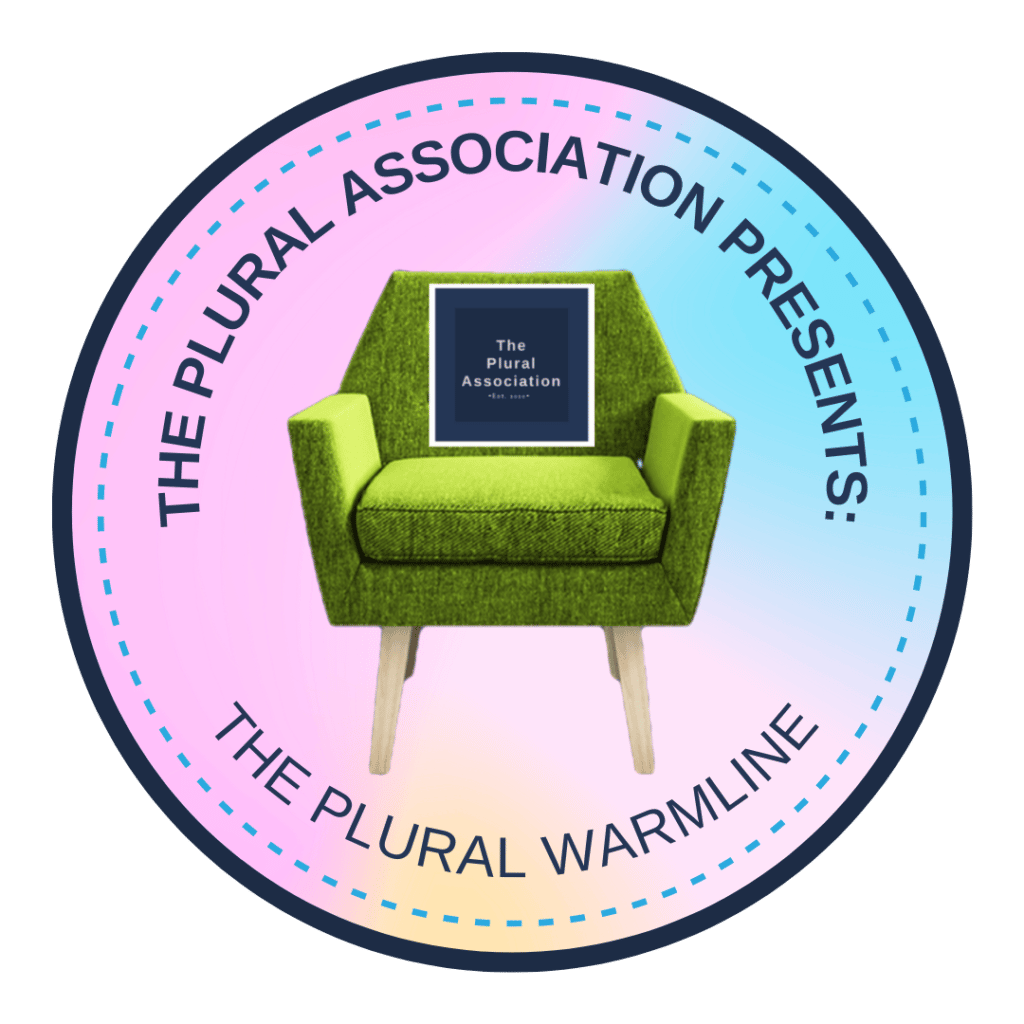
How can we help?
Please tell Plurals (no matter the label they use) that we exist! Our nonprofit is newly founded and we depend on Plurals telling other Plurals about us.
Are you Plural? (No matter the label you use) sign up as a volunteer.
If you are financially able please consider donating towards our work so we can create more of these resources and continue to provide our many other services including The Plural Warmline, where Systems and their Headmates can call, chat or email with trained, peer support Plural volunteers, for free!
The Plural Association Nonprofit does not receive government or other financial grants and depends fully on community and ally support. Every donation big or small helps, our donation options start at just 3 dollars and we are fully volunteer staffed. Together we empower more Plurals, thank you!
How can we help advocate for DID & Plurals?
There are many things to do. You can help to spread correct information by sharing articles, infographics and resources from various activists & advocates. You can address stigma and misconceptions when they come up, even if you do not know if there are (other) Plurals in the room.
You can comment and leave feedback on articles, videos and other work by Plurals for maximum engagement and to boost their work on social media platforms. If you worry about outing yourself, it might be worth considering to make a profile just for Plural purposes.
You can engage in Plural acceptance week & Pride Day.
Or join the DID Awareness Day on March 5th. (Group edition for DID Awareness Day.)
A great thing to follow is the annual Plural Positivity World Conference by plural events which is lead by The Plural Association. Each year we have an open registration for new (Plural) speakers!
You could collaborate with (Plural) friends, encourage other Plurals, do something local or spread some Plural positivity in other empowering ways. Share other things people can do in the comment section and inspire each other! If possible, you can make a financial contribution to support this movement & community.
Three main points to address when talking about DID or Plurality with someone:
1. It’s real.
2. People with DID are not dangerous but instead the statistic is that people with severe mental illnesses are over 10 times more likely to be victims of violent crime than the general population. Plurals are not like the movies either.
3. Share that plurality is not rare, 3.7% of 31.000 college students scored for DID in research from April 2019.
Are their other resources like this one available?
Yes, we have many educational articles available and release new work frequently.
We also have a resource section on our website that gets updated with new resources like this one. There is also a pastebin with many links to other sources.

As always, we encourage you and your System to follow your own truth, to soul search, to find words, labels, visions, theories and communities that aren’t only within your values but also match your lived experience and/or long term goals, so that you might find belonging and don’t have to try to fit in.
Thank you for investing the time to read this article. Please, feel free to leave comments or feedback in the comment section.
The Plural Association is the first and only grassroots, volunteer and peer-led nonprofit empowering Plurals. Our works, including resources like this, are only possible because of support from Plurals and our allies.
If you found this article helpful, please consider making a donation.
Together we empower more Plurals!
Disclaimer: Thank you for reading our peer article; we hope it was empowering, informative and helpful for you and your System. There are as many Plural experiences, as there are Plurals. So not all information on this website might apply to your situation or be helpful to you; please, use caution. We’re not doctors or clinicians and our nonprofit, our work, and this website in no way provide medical advice, nor does it replace therapy or medication in other ways.
About the authors
The Stronghold System are the proud volunteer founders & CEO of The Plural Association Nonprofit. They are from the Netherlands and reside in a 30-something-year-old body, are nonbinary, parents of an amazing child & 3 cats. They got diagnosed with Dissociative Identity Disorder over 10 years ago & also self ID as Plural.
-
Strongholdhttps://powertotheplurals.com/author/stronghold/
-
Strongholdhttps://powertotheplurals.com/author/stronghold/
-
Strongholdhttps://powertotheplurals.com/author/stronghold/
-
Strongholdhttps://powertotheplurals.com/author/stronghold/

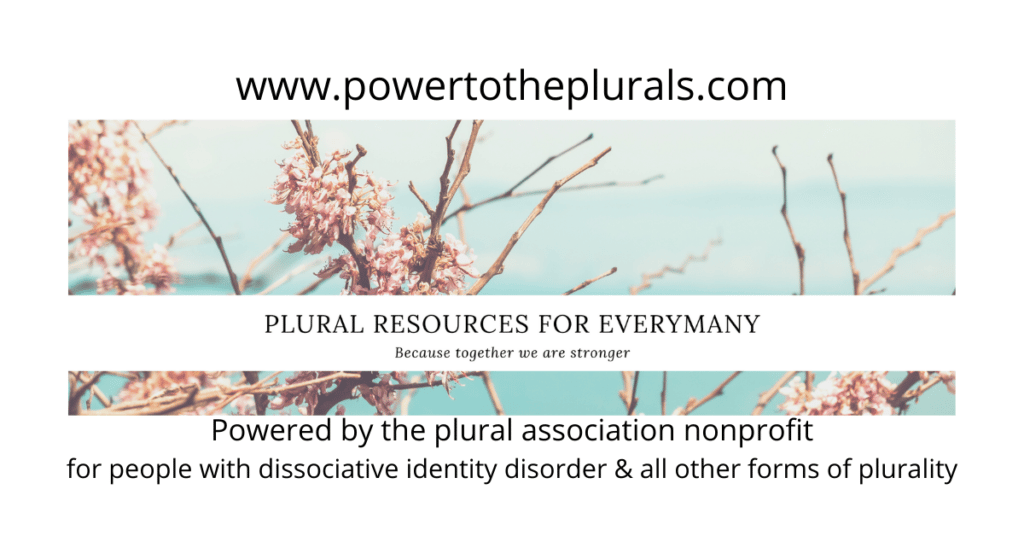
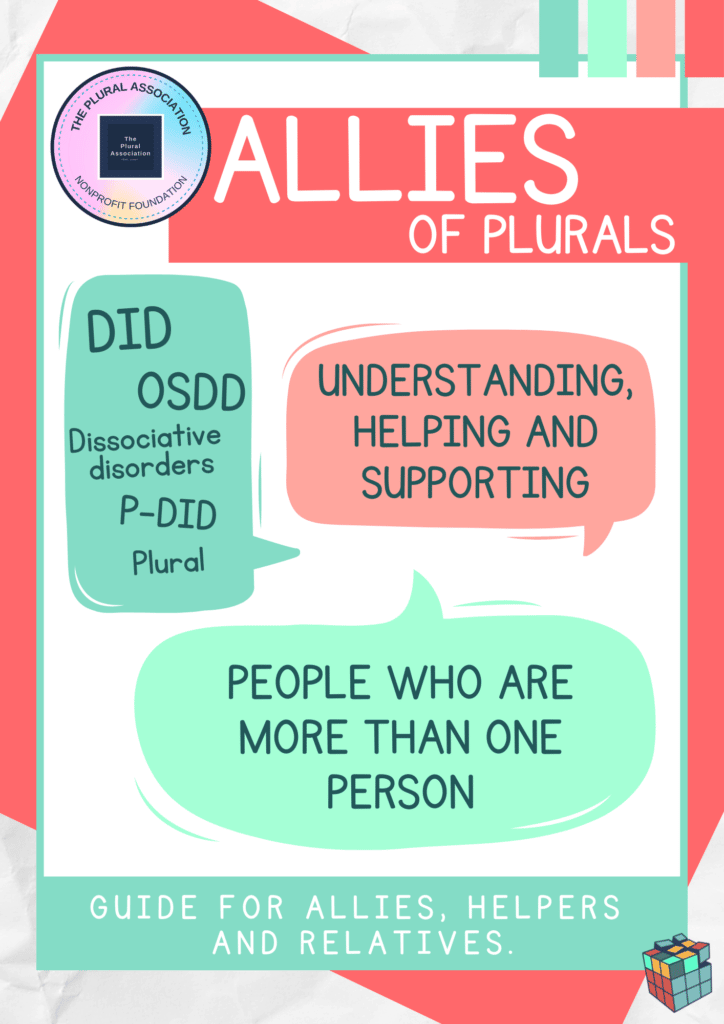
Pingback: Personhood: Are you more than 1 person? You might actually be Plural! Discover the truth in this amazing article. - powertotheplurals.com